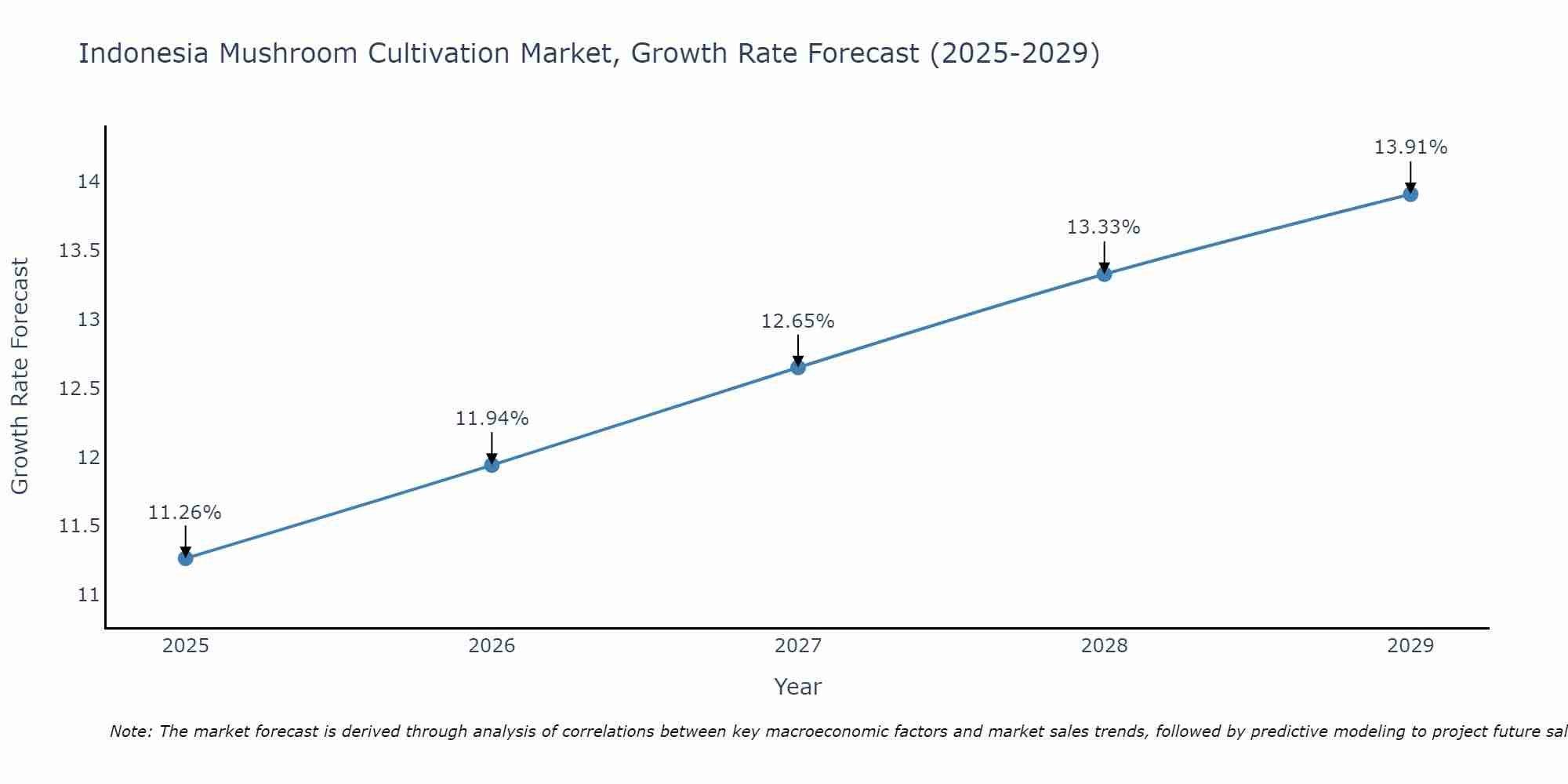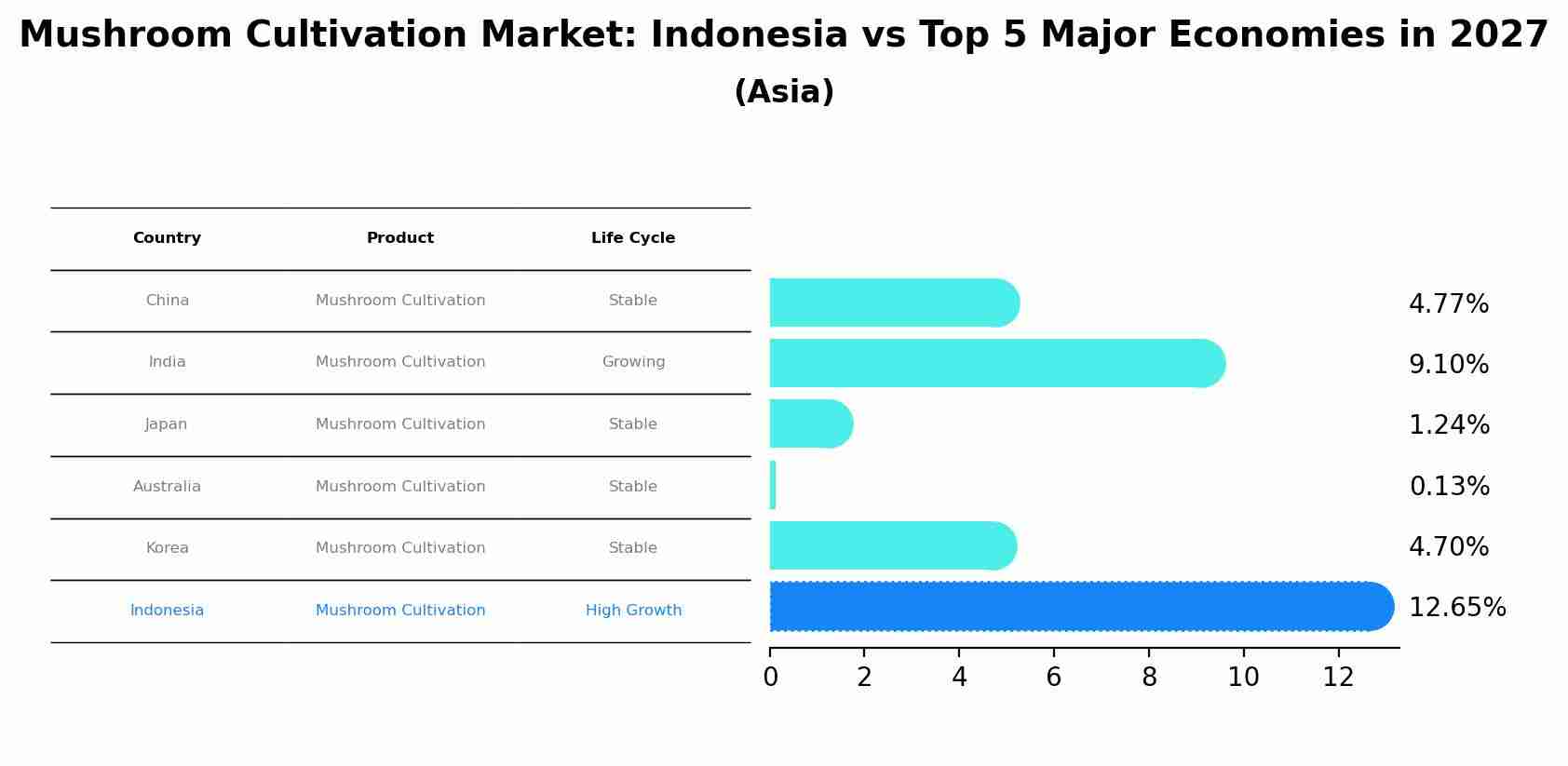Indonesia Mushroom Cultivation Market (2025-2031) Outlook | Companies, Share, Revenue, Trends, Value, Analysis, Growth, Size, Forecast & Industry
| Product Code: ETC383128 | Publication Date: Aug 2022 | Updated Date: Apr 2025 | Product Type: Market Research Report | |
| Publisher: 6Wresearch | Author: Ravi Bhandari | No. of Pages: 75 | No. of Figures: 35 | No. of Tables: 20 |
Indonesia Mushroom Cultivation Market Size Growth Rate
The Indonesia Mushroom Cultivation Market is likely to experience consistent growth rate gains over the period 2025 to 2029. Commencing at 11.26% in 2025, growth builds up to 13.91% by 2029.

Mushroom Cultivation Market: Indonesia vs Top 5 Major Economies in 2027 (Asia)
The Mushroom Cultivation market in Indonesia is projected to grow at a high growth rate of 12.65% by 2027, within the Asia region led by China, along with other countries like India, Japan, Australia and South Korea, collectively shaping a dynamic and evolving market environment driven by innovation and increasing adoption of emerging technologies.

Indonesia Mushroom Cultivation Market Synopsis
Mushroom cultivation is gaining momentum in Indonesia as a lucrative agribusiness venture. Mushrooms, known for their nutritional value and versatility, have found a place in Indonesia cuisine and are also being exported. Oyster mushrooms and shiitake mushrooms are among the popular varieties cultivated locally. The increasing awareness of the health benefits associated with mushrooms and the potential for year-round cultivation make this market promising for both small-scale and large-scale farmers.
Drivers of the Market
The mushroom cultivation market in Indonesia is on an upward trajectory, primarily due to several key drivers. Firstly, there is a growing awareness of the nutritional benefits and versatility of mushrooms in the Indonesia diet. This has led to increased consumption and demand for various mushroom varieties. Additionally, mushroom cultivation is gaining popularity as a sustainable and environmentally friendly agricultural practice, which aligns with the growing trend of eco-consciousness among consumers. Moreover, government initiatives and support for the cultivation of mushrooms are further bolstering the market`s growth potential.
Challenges of the Market
The mushroom cultivation market in Indonesia is challenged by factors such as climate sensitivity and disease management. Mushrooms are sensitive to temperature and humidity variations, making cultivation practices susceptible to climate change impacts. Additionally, diseases can quickly spread in mushroom farms, leading to crop losses if not managed effectively. Technical knowledge and expertise in mushroom cultivation are essential but can be limited, especially among small-scale farmers. Marketing and distribution hurdles also exist, as fresh mushrooms have a limited shelf life, necessitating efficient supply chain management.
COVID-19 Impact on the Market
Mushroom cultivation in Indonesia has been gaining popularity as a sustainable source of food. The pandemic encouraged interest in home-based agriculture. The market is expected to grow further as awareness of its nutritional benefits increases.
Key Players in the Market
Mushroom cultivation is a growing industry in Indonesia, with a focus on both domestic and export markets. Key players in this market include PT Sido Muncul Tbk and PT TaniHub Group.
Key Highlights of the Report:
- Indonesia Mushroom Cultivation Market Outlook
- Market Size of Indonesia Mushroom Cultivation Market, 2024
- Forecast of Indonesia Mushroom Cultivation Market, 2031
- Historical Data and Forecast of Indonesia Mushroom Cultivation Revenues & Volume for the Period 2021-2031
- Indonesia Mushroom Cultivation Market Trend Evolution
- Indonesia Mushroom Cultivation Market Drivers and Challenges
- Indonesia Mushroom Cultivation Price Trends
- Indonesia Mushroom Cultivation Porter's Five Forces
- Indonesia Mushroom Cultivation Industry Life Cycle
- Historical Data and Forecast of Indonesia Mushroom Cultivation Market Revenues & Volume By Type for the Period 2021-2031
- Historical Data and Forecast of Indonesia Mushroom Cultivation Market Revenues & Volume By Button Mushroom for the Period 2021-2031
- Historical Data and Forecast of Indonesia Mushroom Cultivation Market Revenues & Volume By Oyster Mushroom for the Period 2021-2031
- Historical Data and Forecast of Indonesia Mushroom Cultivation Market Revenues & Volume By Shiitake Mushroom for the Period 2021-2031
- Historical Data and Forecast of Indonesia Mushroom Cultivation Market Revenues & Volume By Others for the Period 2021-2031
- Indonesia Mushroom Cultivation Import Export Trade Statistics
- Market Opportunity Assessment By Type
- Indonesia Mushroom Cultivation Top Companies Market Share
- Indonesia Mushroom Cultivation Competitive Benchmarking By Technical and Operational Parameters
- Indonesia Mushroom Cultivation Company Profiles
- Indonesia Mushroom Cultivation Key Strategic Recommendations
Frequently Asked Questions About the Market Study (FAQs):
- Single User License$ 1,995
- Department License$ 2,400
- Site License$ 3,120
- Global License$ 3,795
Search
Thought Leadership and Analyst Meet
Our Clients
Related Reports
- Afghanistan Apparel Market (2026-2032) | Growth, Outlook, Industry, Segmentation, Forecast, Size, Companies, Trends, Value, Share, Analysis & Revenue
- Canada Oil and Gas Market (2026-2032) | Share, Segmentation, Value, Industry, Trends, Forecast, Analysis, Size & Revenue, Growth, Competitive Landscape, Outlook, Companies
- Germany Breakfast Food Market (2026-2032) | Industry, Share, Growth, Size, Companies, Value, Analysis, Revenue, Trends, Forecast & Outlook
- Australia Briquette Market (2025-2031) | Growth, Size, Revenue, Forecast, Analysis, Trends, Value, Share, Industry & Companies
- Vietnam System Integrator Market (2025-2031) | Size, Companies, Analysis, Industry, Value, Forecast, Growth, Trends, Revenue & Share
- ASEAN and Thailand Brain Health Supplements Market (2025-2031) | Strategy, Consumer Insights, Analysis, Investment Trends, Opportunities, Growth, Size, Share, Industry, Revenue, Segments, Value, Segmentation, Supply, Forecast, Restraints, Outlook, Competition, Drivers, Trends, Demand, Pricing Analysis, Competitive, Strategic Insights, Companies, Challenges
- ASEAN Bearings Market (2025-2031) | Strategy, Consumer Insights, Analysis, Investment Trends, Opportunities, Growth, Size, Share, Industry, Revenue, Segments, Value, Segmentation, Supply, Forecast, Restraints, Outlook, Competition, Drivers, Trends, Demand, Pricing Analysis, Competitive, Strategic Insights, Companies, Challenges
- Europe Flooring Market (2025-2031) | Outlook, Share, Industry, Trends, Forecast, Companies, Revenue, Size, Analysis, Growth & Value
- Saudi Arabia Manlift Market (2025-2031) | Outlook, Size, Growth, Trends, Companies, Industry, Revenue, Value, Share, Forecast & Analysis
- Uganda Excavator, Crane, and Wheel Loaders Market (2025-2031) | Strategy, Consumer Insights, Analysis, Investment Trends, Opportunities, Growth, Size, Share, Industry, Revenue, Segments, Value, Segmentation, Supply, Forecast, Restraints, Outlook, Competition, Drivers, Trends, Demand, Pricing Analysis, Competitive, Strategic Insights, Companies, Challenges
Industry Events and Analyst Meet
Whitepaper
- Middle East & Africa Commercial Security Market Click here to view more.
- Middle East & Africa Fire Safety Systems & Equipment Market Click here to view more.
- GCC Drone Market Click here to view more.
- Middle East Lighting Fixture Market Click here to view more.
- GCC Physical & Perimeter Security Market Click here to view more.
6WResearch In News
- Doha a strategic location for EV manufacturing hub: IPA Qatar
- Demand for luxury TVs surging in the GCC, says Samsung
- Empowering Growth: The Thriving Journey of Bangladesh’s Cable Industry
- Demand for luxury TVs surging in the GCC, says Samsung
- Video call with a traditional healer? Once unthinkable, it’s now common in South Africa
- Intelligent Buildings To Smooth GCC’s Path To Net Zero


















